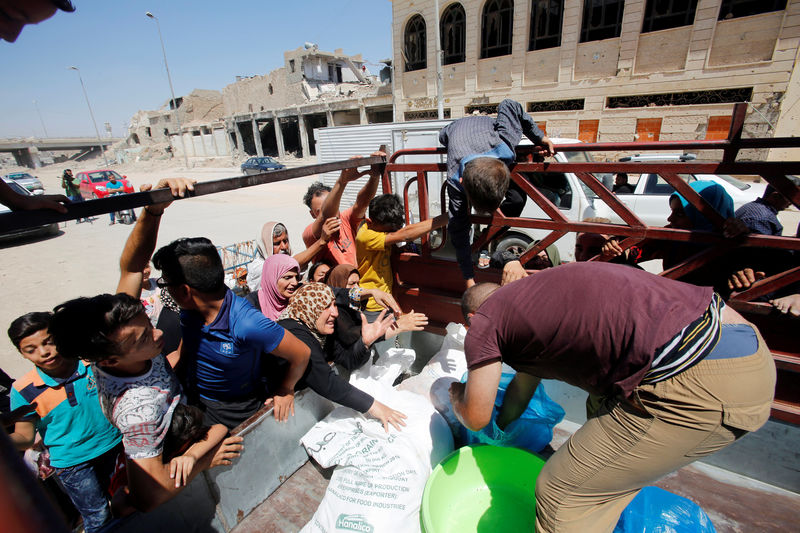 © Reuters. Citizens gather around a car that distribute meat for the poor families in the old city of Mosul
© Reuters. Citizens gather around a car that distribute meat for the poor families in the old city of Mosul2/2
By Maria Tsvetkova
MOSUL, Iraq (Reuters) – On a scorching August afternoon, an angry crowd besieged a mini-truck loaded with meat of two slaughtered cows amidst the ruins of what was the last Islamic State (IS) bastion in Mosul.
In a desperate scramble, they grabbed beef from a man standing in the open back of the truck and, after it pulled away, some stayed on to descend on the next one to arrive.
Part of an annual ritual of Eid al-Adha celebrations, the deliveries did little to satisfy people living in the rubble of Mosul’s Old City more than a year after IS was ousted in a final battle reduced many inhabitants to homeless beggars.
“There are many residents who need aid in getting food and rebuilding their houses,” 24-year-old Ali Sharif said on Thursday after taking a plastic bag with meat from one of the cars. “Everyone here was affected by war.”
Since Iraqi forces celebrated victory over IS, life for the Sunni Muslim inhabitants of ancient west Mosul, some of whom welcomed IS’s arrival in 2014, has hardly improved. That has left them no happier with the Shi’ite-led government in Baghdad they long accused of treating them like second-class citizens.
“We will give this to the poor people here to help them and we ask God to bless us. Our government doesn’t do anything (to help them),” Ali Aga, a local logistics specialist, said as he headed into a labyrinth of alleyways in Mosul’s ancient Old City to knock on doors and hand over packets of fresh beef.
Many of the Old City’s narrow streets remain inundated by wreckage left by the air strikes of U.S.-led coalition forces that helped Iraqi government forces drive out IS after nine months of devastating urban warfare.
The remains of some walls look like they are about to collapse. Decayed body parts can still be seen, and smelled, amidst the debris where the most severe fighting raged west of the River Tigris that bisects Iraq’s second city.
To help towns laid to waste in fighting that broke IS’s grip on a third of Iraq, Baghdad set up the Reconstruction Fund for Areas Affected by Terroristic Operations (ReFAATO).
The reconstruction plan for Mosul and the whole of surrounding Nineveh governorate targeted 78 projects for 2017-2018 worth 75.5 billion Iraqi dinars ($63.69 million), supplemented by a 135-million-euro ($154.4 million) loan from Germany, according to ReFAATO figures published on Aug. 20.
But experts say rebuilding Mosul alone – which had a pre-war population of 2 million and now has 646,000 homeless – is expected to cost billions of dollars.
“Low budgets compared to size of damage” pose a major challenge, ReFAATO said in a statement this month.
CAMPING OUT NEAR THE DEAD
In early August, Hazem Mohammed, 52, and his family returned to a heap of debris that used to be his home next to a heavily damaged former football field, a few minutes’ walk from deserted ruins still reeking of unrecovered human remains.
Mohammed settled down in a tent pitched outside his old house, affording his family a little shade in the 43 Celsius summer heat. On Thursday, his wife boiled water on an open fire outside the tent with small children playing inside.
“I decided to live with my family in this tent to encourage the Iraqi government and humanitarian organizations to rebuild my house and other destroyed houses in the Old City,” he said.
“We are a poor family. We don’t have money to live in dignity. We suffer from lack of food and we don’t have enough furniture because it is under the ruins of our house now.”
A passing car stopped at the tent and the driver, who gave his name as Mohammed Saleh, handed out a bag of Eid meat.
“I’m afraid that the government’s failure to rebuild infrastructure could bring a return of extremism,” Saleh said.
Mosul municipal officials and Western donors are concerned that the slowness of reconstruction might rekindle Sunni-Shi’ite sectarian grievances that Islamic State exploited.
Even a walk through an upscale district of eastern Mosul, which escaped the worst fighting and where life has largely returned to bustling normality, can be dangerous.
An explosion on Tuesday night in the Hay al-Arabi neighborhood injured no one but left a roadside crater next to what residents said was the makeshift grave of an IS militant killed in battle. The blast might have been an old grenade or part of the militant’s suicide vest, one resident suggested.
($1 = 1,186.0000 Iraqi dinars)
($1 = 0.8744 euros)
Source: Investing.com





























